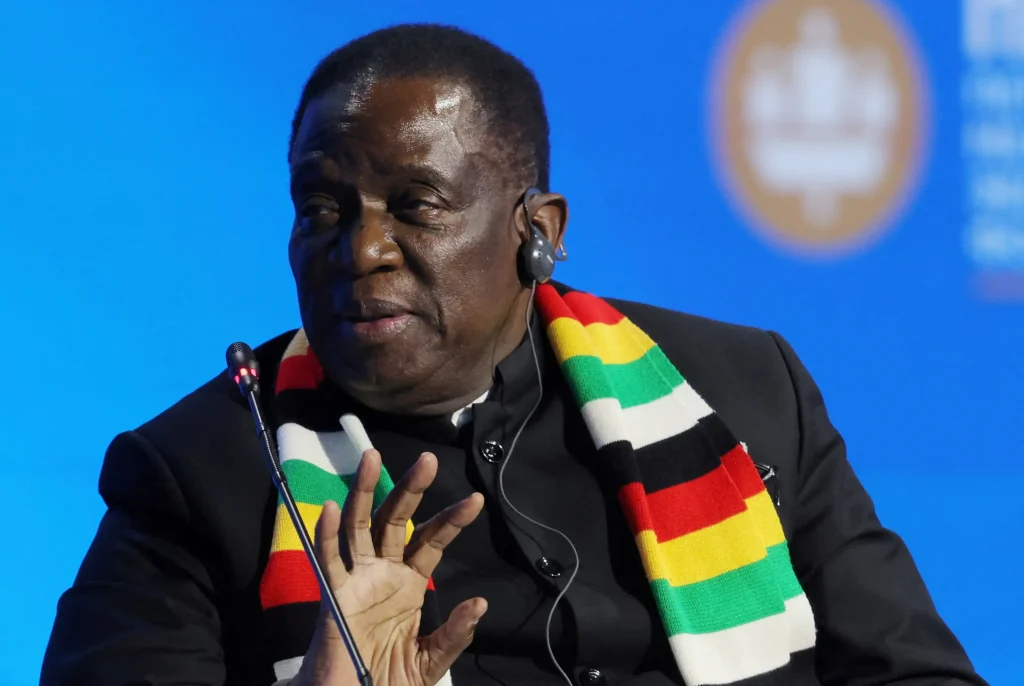Zimbabwe’s ruling ZANU-PF party announced plans to extend President Emmerson Mnangagwa’s tenure by two years, potentially keeping the 83-year-old in power until 2030.
The decision, made at the party’s annual conference in Mutare on Saturday, October 18, 2025, drew enthusiastic support from hundreds of delegates. ZANU-PF, dominant since Zimbabwe’s 1980 independence, aims to amend the Constitution to allow the extension.
Justice Minister Ziyambi Ziyambi, also ZANU-PF’s legal secretary, stated the party would push for legislative changes to enact the plan. The Constitution currently limits Mnangagwa to two five-year terms, set to end in 2028.
Extending his rule would require revising term-limit clauses, possibly through referendums, a complex process likely to stir controversy.
Mnangagwa’s Rise and Record
Mnangagwa, nicknamed “the Crocodile,” took office in 2017 after a military-led ousting of Robert Mugabe, Zimbabwe’s leader for 37 years. He won a disputed election in 2018 and was re-elected in 2023. Despite calling himself a constitutionalist and pledging not to seek a third term, Mnangagwa now faces pressure from loyalists to stay longer.
Critics, including human rights groups, accuse his government of curbing free speech and political freedoms, especially before the 2023 vote.
Internal party tensions add complexity. Supporters of Vice President Constantino Chiwenga, a key figure in the 2017 coup, oppose the extension, revealing rifts within ZANU-PF. Chiwenga’s allies see him as a potential successor, making the push for Mnangagwa’s extended rule a flashpoint for power struggles.
Opposition Voices Concerns
Nelson Chamisa, former leader of the Citizens Coalition for Change (CCC), rejected ZANU-PF’s resolution, arguing it binds only party members, not the nation. “Zimbabwe’s people decide the country’s future, not one party,” he said, emphasizing democratic principles.
Chamisa, a prominent opposition figure, has long challenged ZANU-PF’s grip, citing electoral irregularities in past polls.
The proposal has sparked debate among Zimbabweans, with some fearing it could deepen authoritarianism. Mnangagwa’s administration faces criticism for economic struggles, including high inflation and unemployment, fueling public discontent. Extending his term risks further polarizing a nation already grappling with these challenges.
Constitutional and Political Hurdles
Amending the Constitution requires parliamentary approval and possibly public referendums, a process fraught with legal and political obstacles.
ZANU-PF’s supermajority in Parliament gives it leverage, but public resistance could complicate matters. Past referendums have faced scrutiny over fairness, and any move to extend Mnangagwa’s rule may trigger protests from opposition groups and civil society.
The plan also raises questions about Zimbabwe’s democratic trajectory. Mnangagwa’s supporters argue he needs more time to stabilize the economy and deliver reforms, while critics see it as a power grab.
The 2023 election, marred by allegations of voter intimidation, adds to skepticism about the government’s commitment to fair processes.
What Lies Ahead
As ZANU-PF moves to enact its plan, Zimbabwe braces for a tense period. The proposed extension could strain relations with international partners, who have called for democratic reforms.
Chamisa and other opposition leaders are likely to rally against the move, potentially galvanizing public opposition. Meanwhile, internal ZANU-PF divisions, particularly around Chiwenga, could shape the outcome.
Mnangagwa’s legacy hangs in the balance. Extending his term might secure his influence but risks further unrest in a nation yearning for change. As Zimbabwe navigates this pivotal moment, the debate over leadership and democracy intensifies, with citizens watching closely for what comes next.
READ ALSO: China and Canada Agree to Revive Dialogue and Strengthen Ties




















